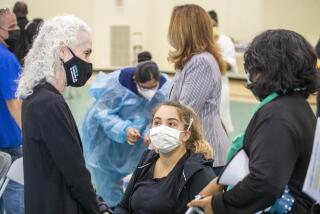Allergy Shots to Be Administered by Nonmedical School Staff
- Share via
As the number of children with life-threatening allergies climbs, the Los Angeles Unified School District is allowing its nurses to teach nonmedical staff how to administer a shot when a student is struck with a severe allergic reaction.
By the end of this month, all 580 school district nurses and 65 substitute nurses will have been shown how to give a preloaded epinephrine shot--the standard medication given to someone experiencing a serious allergic reaction to a food or insect sting.
The nurses’ training is costing the district $30,000. In turn, the nurses have been given the responsibility to train other school personnel--from secretaries to principals--to use the so-called EpiPen if a nurse is not on campus.
The shots can be administered only to students whose parents have supplied the one-dose EpiPen cartridges to school personnel and have given prior permission to use it in an emergency.
The change is a major one for the 722,000-student district, which up to now relied on a staff of nine district physicians to train personnel on how to deal with a highly allergic student. A doctor would visit the school only after a parent made a written request with the district’s Student Health & Human Services office in Los Angeles.
“Through training, prevention and working with the community, LAUSD will become the model school district for the rest of the schools in the United States,” predicted Anne Munoz-Furlong, founder of the Food Allergy Network, a nonprofit organization based in Fairfax, Va. “I know of no other school district the size of L.A. that has this program in place.”
However, making nonmedical staff responsible for determining when a child should receive the shot creates a potential liability for the school district, cautioned Alan Calnan, professor at Southwestern School of Law in Los Angeles.
“Being a temporary custodian, the schools have a special relationship with children to provide basic medical services. On top of that, if you undertake to provide a specific medical service and you do it in a negligent fashion, that enhances your responsibility. They’re stuck between a rock and a hard place in terms of liability,” Calnan said.
Maria Reza, administrator of health and human services for the district, said employees performing assigned duties, including administering an EpiPen shot, are covered by L.A. Unified. “What’s the option? If we’re here to do the best we can for kids and a life is threatened, we need to respond,” Reza said. “We will do what we need to ensure the safety of our kids.”
Three years ago, the district had fewer than 30 requests from parents for EpiPen training, said Karen Maiorca, director of nursing services for L.A. Unified. Last school year, there were 164 severely allergic students with doctor’s orders to receive a dose of epinephrine in the event of a severe reaction, she said.
Recognizing symptoms and giving the proper medication quickly are crucial during an allergic reaction. Severe reactions could include breathing difficulties, a drop in blood pressure or shock, which in some cases could be fatal if not treated immediately.
Ninety percent of allergic reactions are caused by eight foods: peanuts, tree nuts such as walnuts and pecans, fish, shellfish, eggs, milk, soy and wheat, according to the Food Allergy Network.
It is estimated that 3% of school-age children have a food allergy and one in 150 has a peanut allergy, Munoz-Furlong said.
About 100 people die each year from allergic reactions to food, and about 50 people die from insect stings, according to the Food Allergy Network.
To raise awareness among teachers, nurses, parents and food service workers, the district is considering distributing a manual that contains information about food allergies, said Dr. Shobha Naimpally, student medical services director for L.A. Unified.
More to Read
Sign up for Essential California
The most important California stories and recommendations in your inbox every morning.
You may occasionally receive promotional content from the Los Angeles Times.













